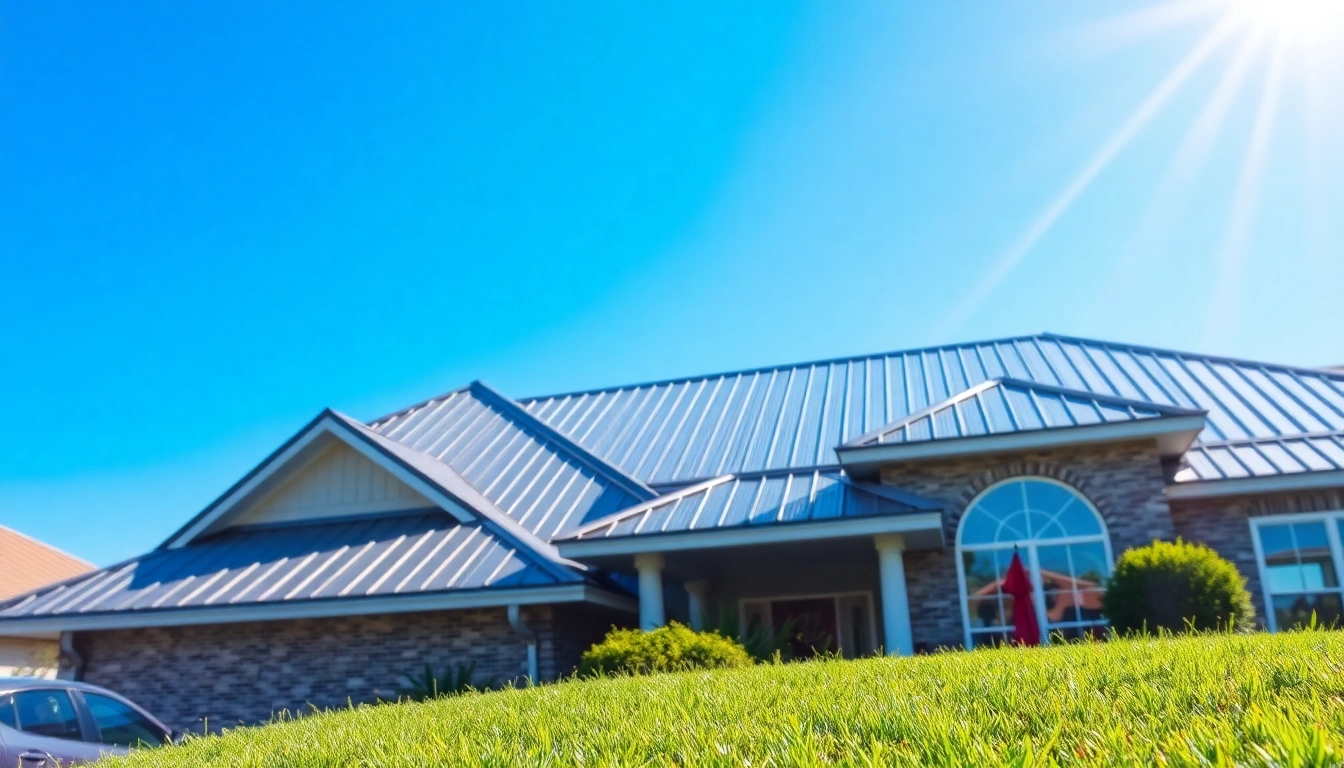
1. Understanding Florida Metal Roofs
1.1 What is a Metal Roof?
A metal roof is a roofing system made from metal pieces or tiles characterized by its durability, energy efficiency, and aesthetic appeal. These roofs can be crafted from various metals, including aluminum, steel, copper, and zinc. Their widespread use in residential and commercial constructions is primarily due to their longevity and ability to withstand severe weather conditions, which is particularly relevant in Florida due to its climatic challenges.
1.2 Key Benefits of Metal Roofing in Florida
The advantages of opting for a florida metal roof are multifaceted. Firstly, metal roofs are known for their remarkable lifespan, often lasting 40 to 70 years with proper maintenance. They are highly resistant to extreme weather conditions that prevail in Florida, such as hurricanes, heat, and humidity. This durability translates into less frequent replacements and maintenance costs, providing homeowners with significant long-term savings. Additionally, metal roofs are energy-efficient, offering superior reflectivity which helps in reducing cooling costs, a critical consideration in Florida’s hot climate.
1.3 Common Types of Florida Metal Roofs
Florida homeowners often choose specific types of metal roofs suited to their regional climate and architectural styles. Popular variants include:
- Standing Seam Metal Roofs: These are characterized by vertical seams that interlock, creating a sleek appearance and superior water resistance. They are especially effective for handling heavy rain.
- Metal Shingles: Available in a variety of styles that can mimic traditional roofing materials like tiles or wood shakes. Metal shingles combine aesthetic flexibility with the durability of metal.
- Stone-Coated Steel: This type provides both the durability of steel and a variety of appearance options through stone coatings, ideal for residential applications.
2. Advantages of Florida Metal Roofs
2.1 Energy Efficiency and Cost Savings
Metal roofs can significantlyenhance a home’s energy efficiency. The reflective properties of metal surfaces help in reducing heat absorption, translating into lower cooling costs during the sweltering Florida summers. Studies indicate that homes with metal roofs can reduce their energy bills by 10-25% compared to traditional asphalt shingle roofs.
2.2 Longevity and Durability
One of the defining characteristics of metal roofing is its longevity. Metal roofs are designed to withstand the test of time, with warranties often covering 30 years or more. Materials like aluminum and galvanized steel are particularly rust-resistant, making them ideal for the humid Florida environment.
2.3 Resistance to Florida’s Weather Conditions
Florida is notorious for its severe weather, including hurricanes and tropical storms. Metal roofs are engineered to withstand wind speeds of up to 140 mph, making them an excellent choice for coastal regions. Furthermore, metal roofs are resistant to heavy rainfall, preventing water from pooling and causing leaks or water damage. Their ability to reflect heat also reduces expansion and contraction issues often seen in traditional roofing materials during extreme temperature fluctuations.
3. Installation Process for Florida Metal Roofs
3.1 Preparing for Installation
Prior to installation, homeowners should choose a reliable contractor familiar with Florida’s building codes and requirements. The preparation phase includes assessing the roof’s current condition, budgeting for the project, and selecting the appropriate materials based on aesthetic preferences and functional needs.
3.2 Steps in the Installation Process
The installation process typically involves several key steps:
- Site Preparation: Protecting landscaping and preparing the work area.
- Roof Deck Inspection: Assessing the existing roof for damage or needed repairs.
- Underlayment Installation: A water-resistant barrier is installed to provide additional protection against moisture.
- Metal Panel Installation: Panels are precisely cut and fastened to the roof deck, ensuring secure placement and alignment.
- Finishing Touches: Installing ridge caps, flashings, and trims to complete the system.
3.3 Post-Installation Checklist
After installation, it’s vital to conduct a thorough inspection, ensuring that all components are properly fitted and secured. Homeowners should also ensure that gutters and drainage systems are functioning properly to prevent any water damage.
4. Maintenance for Metal Roofs in Florida
4.1 Regular Inspection and Cleaning
Routine inspections are essential to maintain a metal roof’s integrity. Homeowners should check for any signs of rust, damage, or loose components at least twice a year—preferably in spring and fall. Regular cleaning helps prevent algae and moss buildup, which can compromise the roof’s effectiveness.
4.2 Addressing Common Issues
Common issues such as rust or scratches can usually be treated by applying specialized paint or metal roof coatings. If leaks are detected, it’s critical to address these immediately to prevent further damage to the structure.
4.3 Preparing for Hurricane Season
With hurricane season being a significant concern in Florida, homeowners should reinforce their metal roofs by ensuring that all fasteners are secured tightly and that all drainage systems are clear of debris. Having an emergency repair kit on hand can also be beneficial.
5. Costs and Considerations for Florida Metal Roofs
5.1 Factors Affecting Metal Roof Costs
The overall cost of installing a metal roof in Florida can vary based on various factors, including material choice, roof pitch, labor costs, and any additional features (like insulation or ventilation systems). Typically, metal roofing may have a higher upfront cost compared to asphalt shingles, but its long-term savings on energy and longevity often outweigh the initial investment.
5.2 Comparing Metal Roofing to Other Materials
When comparing metal roofs to traditional roofing systems, such as asphalt shingles or tile, metal roofs often outperform in durability and energy efficiency. Asphalt shingles might require more frequent replacements, while tile roofs, while aesthetically pleasing, can be more expensive and heavier, requiring additional structural support.
5.3 Homeowner Tips for Selecting a Roofing Contractor
Choosing a reliable contractor is crucial for ensuring a successful roofing project. Homeowners should seek contractors with experience specifically in metal roofing and check for licensing and insurance. Obtaining multiple quotes and reviews from previous clients can also aid in the decision-making process.